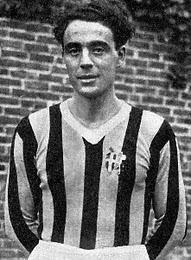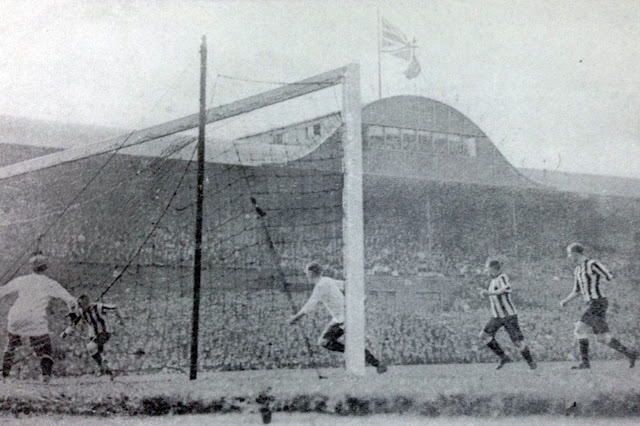It's hard to imagine a time when football did not enjoy mass popularity, and unless you've ever tried to organise a works or pub team , it's equally difficult to appreciate the obstacles that Alcock, Kinnaird et al overcame in order to bring the game to a wider public.
As Alcock himself reflected in 1880:
What was ten or fifteen years ago the recreation of a few … has now become the pursuit of thousands – an athletic exercise, carried on under a strict system … almost magnified into a profession.
The world of Association football in the 1860s and early 1870s was narrow and parochial, described in correspondence to the press as a 'local clique.'
A great sense of fun also reaches out to us across the years- these were hip young men engaged in something novel and almost esoteric.
Alcock, in particular, was always on the lookout for novelty- ultimately it was this desire that gave us both international football and the FA Cup.
In 1867 a combined Eton and Harrow team challenged The Rest of the World.
A fitting example of how the most rag tag scratch matches in which these pioneers were involved has retained a place in the annals of the Association game, for the first match , which took place on January 8th 1867 , The World (referred to in some quarters of the press as The Universe) could only muster 8 players.
The 8 who took to the field at Westminster's Vincent Square ground were:
The Eton Harrow line up was: A.F Kinnaird (E), E Freeth (E), C.J Thornton (E), E.L Corrie (E), E.A Owen (E), A Crompton (H) & F.R Broughton (H).
The game ended in a 2-2 draw.
I note that Tebbut played both for and against The World.
As Alcock himself reflected in 1880:
What was ten or fifteen years ago the recreation of a few … has now become the pursuit of thousands – an athletic exercise, carried on under a strict system … almost magnified into a profession.
The world of Association football in the 1860s and early 1870s was narrow and parochial, described in correspondence to the press as a 'local clique.'
A great sense of fun also reaches out to us across the years- these were hip young men engaged in something novel and almost esoteric.
Alcock, in particular, was always on the lookout for novelty- ultimately it was this desire that gave us both international football and the FA Cup.
In 1867 a combined Eton and Harrow team challenged The Rest of the World.
A fitting example of how the most rag tag scratch matches in which these pioneers were involved has retained a place in the annals of the Association game, for the first match , which took place on January 8th 1867 , The World (referred to in some quarters of the press as The Universe) could only muster 8 players.
The 8 who took to the field at Westminster's Vincent Square ground were:
C.W Alcock (Old Harrovians / Wanderers)
K Muir McKenzie (Old Carthusians / Wanderers)
M Muir McKenzie (Old Carthusians / Wanderers)
H.F Deacon (Civil Service)
H.G Phipps (Old Harrovians)
J.E Tayloe (Old Westminsters)
C.M Tebbut (Wanderers)
C.G Waudby (Civil Service)
Selected but absent were:
F Lucas (Old Westminsters)
S.H West (Westminster School)
W.J Dixon (Westminster School)
The Eton Harrow line up was: A.F Kinnaird (E), E Freeth (E), C.J Thornton (E), E.L Corrie (E), E.A Owen (E), A Crompton (H) & F.R Broughton (H).
The game ended in a 2-2 draw.
The Vincent Square playing fields can still be seen in London SW1.
For the rematch, held at the same venue on 23.01.67, The World turned out only 7 players. Despite the fact that Eton and Harrow had a one man advantage The World (who were practically Old Carthusians) ran out 0-2 winners.
K Muir McKenzie (Old Carthusians / Wanderers)
M Muir McKenzie (Old Carthusians / Wanderers)
J Butter (Charterhouse School)
E.C.S Gibson (Charterhouse School)
C.E.B Nepean (Charterhouse School)
J.A Foote (Charterhouse School)
J Kirkpatrick (Civil Service)
Selected but absent were:
O.S Walford
W.J Dixon (Westminster School)
E.C Bovill
H.J Smith
The Eton Harrow line up was: A.F Kinnaird (E), A.L Gallus/ C.W Alcock (H), E Freeth (E), C.M Tebbut, S.T Holland, J.H Morgan, E Trower & H.F Deacon.
I note that Tebbut played both for and against The World.


























